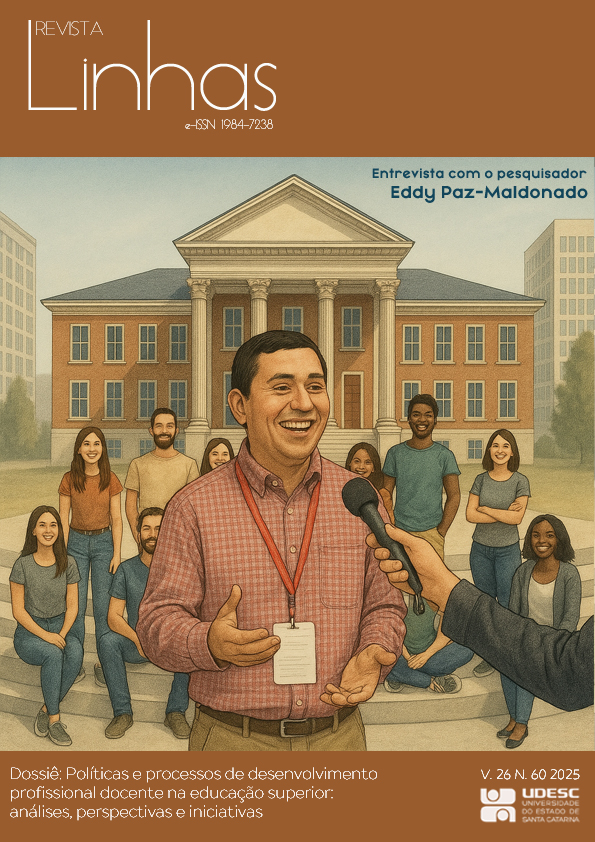Diálogo, quefazer ético e inclusão na Educação de Jovens, Adultos e Idosos (EJAI): uma prática de educação popular
DOI:
https://doi.org/10.5965/1984723826602025257Palavras-chave:
diálogo, quefazer ético, inclusão, EJAI, FreireResumo
O objetivo deste estudo é investigar como o diálogo possibilita um quefazer ético para a inclusão educacional na educação de jovens, adultos e idosos, tendo por reflexão um dos encontros dialógicos educativos com os estudantes da EJAI. Consiste em um recorte de pesquisa-ação que vem sendo desenvolvida desde 2022, com estudantes em condição de deficiência, em uma escola da rede municipal de ensino de Belém, em turma da EJAI, financiada pelo CNPq. O foco deste estudo é para a ética e a inclusão educacional na educação de jovens, adultos e idosos, tendo por base o pensamento educacional de Paulo Freire, sendo estabelecida a interface entre educação de jovens, adultos e idosos e a educação especial. Trata-se de uma pesquisa-ação, cujos participantes são estudantes em condição de deficiência da EJAI, no turno noturno, matriculados em diferentes turmas de uma escola municipal, bem como educadores de um Núcleo de Educação Popular. As estratégias metodológicas são levantamento bibliográfico, levantamento documental e dinâmicas pedagógicas efetivadas nos encontros dialógicos educativos. A sistematização e a análise das informações têm por base a prática educativa realizada com a turma de EJAI, destacando-se o conteúdo discursivo de um encontro educativo que tematizou saberes que envolvem as diferenças e a discussão do “corpo negro (afro-indígena) como resistência”. Entre os resultados destaca-se que o diálogo é fundamental para o desenvolvimento de um quefazer ético necessário à inclusão educacional de educandos com deficiência da Educação de Jovens, Adultos e Idosos.
Downloads
Referências
BARBIER, Renée. A pesquisa-ação. Brasília, DF: Liber Livro Editora, 2004.
BRANDÃO, Carlos Rodrigues. Repensando a pesquisa participante. São Paulo: Editora Brasiliense, 1999.
BRASIL. Resolução nº 466, de 12 de dezembro de 2012. Brasília, DF: MS, 2012. Disponível em: https://conselho.saude.gov.br/resolucoes/2012/Reso466.pdf. Acesso em: 22 fev. 2023.
BRASIL. Resolução nº 510, de 07 de abril de 2016. Brasília, DF: MS, 2016. Disponível em: https://conselho.saude.gov.br/resolucoes/2016/Reso510.pdf. Acesso em: 22 fev. 2023.
BRASIL. Política Nacional de Educação Especial na perspectiva da Educação Inclusiva, 2008. Brasília, DF: MEC, 2008. Disponível: http://portal.mec.gov.br/arquivos/pdf/politicaeducespecial.pdf. Acesso em: 26 fev. 2023.
FREIRE, Paulo; SHOR, Ira. Medo e ousadia: o cotidiano do professor. 15. ed. Rio de Janeiro: Paz e Terra, 2021.
FREIRE, Paulo; GUIMARÃES, Sérgio. Partir da infância: diálogos sobre educação. 3. ed. Rio de Janeiro: Paz e Terra, 2021.
FREIRE, Paulo. Pedagogia do oprimido. 43. ed. Rio de Janeiro: Paz e Terra, 2005.
FREIRE, Paulo. Política e educação. São Paulo: Cortez, 1993.
FREIRE, Paulo. Pedagogia da indignação: cartas pedagógicas e outros escritos. São Paulo: Editora UNESP, 2000.
FREIRE, Paulo. Educação como prática da liberdade. 29. ed. Rio de Janeiro: Paz e Terra, 2006.
GONZALEZ, Lélia; HASENBALG, Carlos. Lugar de negro. 1. ed. Rio de Janeiro: Zahar, 2022.
HOOKS, Bell. Erguer a voz: pensar como feminista, pensar como mulher negra. São Paulo: Elefante, 2019.
MINAYO, Maria Cecília de Souza. Ciência, técnica e arte: o desafio da pesquisa social. (org.). In: MINAYO, Maria Cecília de Souza. Pesquisa social: teoria, método e criatividade. 18 ed. Petrópolis: Vozes, 2001. p. [9-15]
MUNANGA, Kabengele; GOMES, Nilma Lino. A resistência negra: das revoltas ao movimento negro contemporâneo, in. MUNANGA, Kabengele; GOMES, Nilma Lino. O Negro no Brasil de hoje. 3 ed. São Paulo: Global Editora, 2006. p. [108-137]
SILVA, Miguel Costa; LOBATO, Keila de Jesus Morais; LIMA, Yago Melo de; SOUZA, Jéssica Patrícia Silva de; SANTOS, Pâmela Suelem Braga dos; RODRIGUES, Kássya Christinna Oliveira. Relatório Práticas Educativas Inclusivas Freireanas com Jovens e Adultos na escola municipal Padre Leandro Pinheiro. Belém-Pa: NEP, 2023.
Downloads
Publicado
Como Citar
Edição
Seção
Licença
Copyright (c) 2025 Revista Linhas

Este trabalho está licenciado sob uma licença Creative Commons Attribution-NonCommercial-NoDerivatives 4.0 International License.
Os artigos publicados pela revista são de uso gratuito, destinados a aplicações educacionais e não comerciais. Os direitos autorais são todos cedidos à revista. Os artigos cujos autores são identificados representam a expressão do ponto de vista de seus autores e não a posição oficial da Revista Linhas ou do Programa de Pós-Graduação em Educação da Universidade do Estado de Santa Catarina.

A Revista Linhas está licenciada com uma Licença Creative Commons - Atribuição-NãoComercial-SemDerivações 4.0 Internacional.


